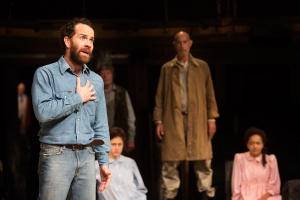29/09/15
Well, you can’t say the show wasn’t big enough.
Infamous rock-curmudgeon Roger Waters has finally released his long talked-about movie adaptation of The Wall and it is, as you might expect, a mammoth undertaking. Co-directed by Waters and Sean Evans, it’s essentially a documentary, culled from the show’s three year long world tour. The concert footage is intercut with a more personal tale, in which Waters drives across France and Italy to visit the graves of his grandfather and father, both of them the victims of war. It makes for a lengthy cinematic experience, a bum-numbing two hours and fifty minutes in total. The original double album was, in Waters’ own words, ‘the whinging of an over-priviliged rock star.’ But across the years, it has developed into something more worthy, a powerful polemic about the futility of war and a tribute to ‘the fallen.’ There’s no doubting Waters’ absolute sincerity in this, even if the personal footage occasionally feels a tad over-indulgent. I could have done without his drunken ramblings to an Italian barman, but the scenes where he plays a simple trumpet theme in two different graveyards is, it has to be said, touching.
As for the show itself, The Wall is what it has always been – a great big sprawling carnival of sound and light, shot through with occasional flashes of pure brilliance. I always thought that it was a patchy double album that could have been a killer single album. As somebody who has been a Pink Floyd fan since 1967, this was of course, a movie I had to see – and it’s definitely a marked improvement on Alan Parker’s rather shrill attempt to film it in 1982. It’s not all plain sailing though. In this day and age, the scantily-clad female imagery that accompanies Young Lust looks suspiciously like an old rock star having his cake and eating it; and despite Gerald Scarf’s wonderful cartoons to accompany The Trial, I was never convinced that this part of the show actually works. But there are so many other highlights to relish here; the jaw-dropping visuals projected onto the wall as it is built between the band and the audience (such an audacious concept!); the note-perfect guitar work from Snowy White and Dave Kilminster which capture David Gilmour’s sonic stylings perfectly; the hilarious Nuremburg Rally chic of Pink’s paranoia-filled stadium show, and the final spectacle of the wall coming down as a packed crowd bays for its destruction.
The high point? It has to be Comfortably Numb. Close up shots of a transported audience howling the lyrics back at the stage, demonstrate how universally adored this song is – and the moment when Kilminster rises above the parapet to deliver that guitar solo has to be one of the defining moments of rock theatre.
Overheard on the way out, a lady complaining to her husband that what she had just watched was ‘an endless anti-war rant.’ This seems a tad unfair, particularly as said husband had a distinctly beatific smile on his face. You don’t have to be a Pink Floyd fan to enjoy this film, but it certainly helps.
4.2 stars
Philip Caveney














